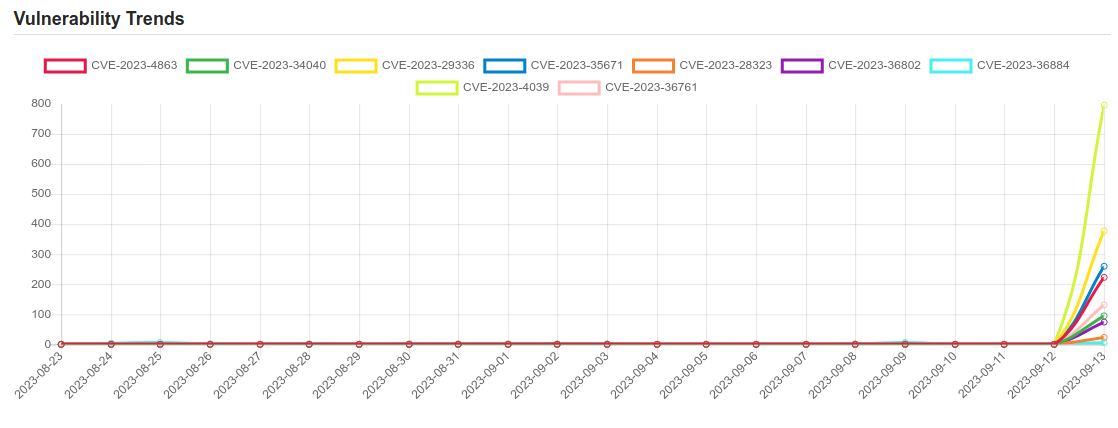Daily Vulnerability Trends: Thu Sep 14 2023

| CVE NAME | CVE Description |
| CVE-2023-4039 | A failure in the -fstack-protector feature in GCC-based toolchains that target AArch64 allows an attacker to exploit an existing buffer overflow in dynamically-sized local variables in your application without this being detected. This stack-protector failure only applies to C99-style dynamically-sized local variables or those created using alloca(). The stack-protector operates as intended for statically-sized local variables. The default behavior when the stack-protector detects an overflow is to terminate your application, resulting in controlled loss of availability. An attacker who can exploit a buffer overflow without triggering the stack-protector might be able to change program flow control to cause an uncontrolled loss of availability or to go further and affect confidentiality or integrity. |
| CVE-2023-36761 | Microsoft Word Information Disclosure Vulnerability |
| CVE-2023-4863 | Heap buffer overflow in WebP in Google Chrome prior to 116.0.5845.187 allowed a remote attacker to perform an out of bounds memory write via a crafted HTML page. (Chromium security severity: Critical) |
| CVE-2023-34040 | In Spring for Apache Kafka 3.0.9 and earlier and versions 2.9.10 and earlier, a possible deserialization attack vector existed, but only if unusual configuration was applied. An attacker would have to construct a malicious serialized object in one of the deserialization exception record headers. Specifically, an application is vulnerable when all of the following are true: * The user does not configure an ErrorHandlingDeserializer for the key and/or value of the record * The user explicitly sets container properties checkDeserExWhenKeyNull and/or checkDeserExWhenValueNull container properties to true. * The user allows untrusted sources to publish to a Kafka topic By default, these properties are false, and the container only attempts to deserialize the headers if an ErrorHandlingDeserializer is configured. The ErrorHandlingDeserializer prevents the vulnerability by removing any such malicious headers before processing the record. |
| CVE-2023-29336 | Win32k Elevation of Privilege Vulnerability |
| CVE-2023-35671 | In onHostEmulationData of HostEmulationManager.java, there is a possible way for a general purpose NFC reader to read the full card number and expiry details when the device is in locked screen mode due to a logic error in the code. This could lead to local information disclosure with no additional execution privileges needed. User interaction is not needed for exploitation. |
| CVE-2023-28323 | A deserialization of untrusted data exists in EPM 2022 Su3 and all prior versions that allows an unauthenticated user to elevate rights. This exploit could potentially be used in conjunction with other OS (Operating System) vulnerabilities to escalate privileges on the machine or be used as a stepping stone to get to other network attached machines. |
| CVE-2023-36802 | Microsoft Streaming Service Proxy Elevation of Privilege Vulnerability |
| CVE-2023-36884 | Windows Search Remote Code Execution Vulnerability |
A considerable amount of time and effort goes into maintaining this website, creating backend automation and creating new features and content for you to make actionable intelligence decisions. Everyone that supports the site helps enable new functionality.
If you like the site, please support us on “Patreon” or “Buy Me A Coffee” using the buttons below
To keep up to date follow us on the below channels.

